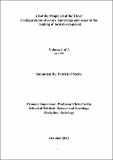| dc.contributor.advisor | Curtin, Chris | |
| dc.contributor.author | O'Reilly, Patrick | |
| dc.date.accessioned | 2012-12-04T12:17:15Z | |
| dc.date.available | 2012-12-04T12:17:15Z | |
| dc.date.issued | 2012-10-26 | |
| dc.identifier.uri | http://hdl.handle.net/10379/3078 | |
| dc.description.abstract | Local development approaches purport to offer a more effective means of addressing development issues in areas experiencing specific socio-economic challenges. By facilitating local involvement in the identification of the issues affecting such areas and in the selection of development objectives, such approaches claim to build community consensus around programmes which are locally owned and driven. To their proponents, a key element of these programmes is that communities benefit from their participation in them. The process of local development is capable of affecting changes at a personal and a collective level which empower individuals, leading to a more equitable distribution of power and resources. However, while the participative processes through which local development programmes are implemented are seen as critical to their successful outcome, little research exists concerning the dynamic processes through which such programmes are worked out in practice. Consequently, fundamental questions concerning the claims made for such programmes to deliver wider local participation, and contribute to the redistribution of power and resources at local level have not been addressed.
This study examines some of these questions. Drawing on elements of Nuitjen¿s practice approach it is shown that such programmes can be understood and examined as dynamic configurations of social practices produced by open ended networks linking actors, knowledge and space. Such configurations transcend the official components of development policy combining both formal and informal elements in the working out of programmes. The study goes on to demonstrated that when examined in this way, the operation of local development programmes can be seen to involve struggles in which a number of actors contest the meaning of such programmes drawing on differing forms of knowledge to do so. This resulted, in the case examined in this study, in the consolidation of the position of certain actors and their agenda at the expense of others. | en_US |
| dc.rights | Attribution-NonCommercial-NoDerivs 3.0 Ireland | |
| dc.rights.uri | https://creativecommons.org/licenses/by-nc-nd/3.0/ie/ | |
| dc.subject | Ethnography | en_US |
| dc.subject | Sociology | en_US |
| dc.subject | Rural Development | en_US |
| dc.subject | Local Development | en_US |
| dc.subject | Actor Networks | en_US |
| dc.subject | Participation | en_US |
| dc.subject | Empowerment | en_US |
| dc.subject | Community Development | en_US |
| dc.subject | Local Elites | en_US |
| dc.subject | Spatial disadvantage | en_US |
| dc.subject | Partnership Programme | en_US |
| dc.title | All of the People all of the Time? Configurations of actors, knowledge and space in the making of local development | en_US |
| dc.type | Thesis | en_US |
| dc.local.note | Examines the operation of a series of local development programmes in County Waterford, Ireland. Considering how these events impacted on the lives of people living in the area, and in particular on whether the programmes were able to foster a more equitable distribution of power and resources in local development. | en_US |
| dc.local.final | Yes | en_US |
| nui.item.downloads | 798 | |


